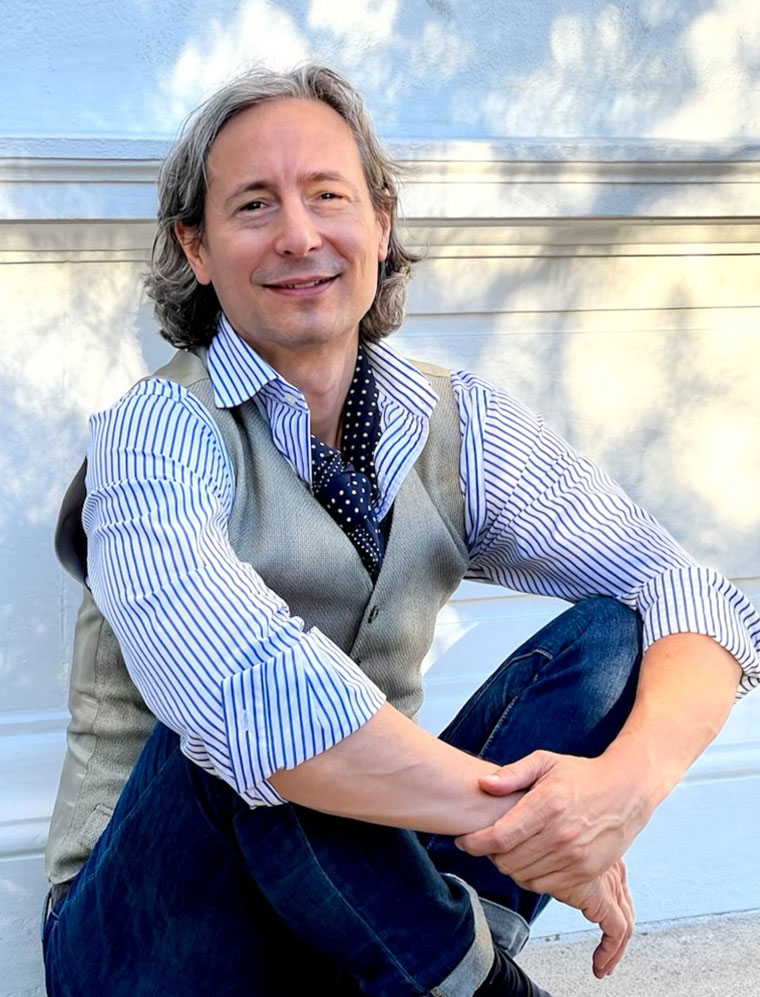BA, MAS, Université Sorbonne Nouvelle. MFA, Brown University. PhD, Universidade de Lisboa. He is a polyglot poet, literary translator, editor, and scholar. As a literary translator and editor, he has published 20 books, including The Galloping Hour: French Poems by Alejandra Pizarnik (with Forrest Gander; New Directions, 2018), The Complete Works of Álvaro de Campos by Fernando Pessoa (with Margaret Jull Costa; New Directions, 2023) and Habla terreña [Field Talk] by Frank Stanford (with Graciela S. Guglielmone; Pre-textos, 2023). His work has appeared in The New Yorker, The Paris Review, The New York Review of Books, Poetry Magazine, Fence, Bomb, Asymptote, and other magazines. Since 2017 Ferrari resides in New York City, where he collaborates with the Endangered Language Alliance (ELA) and hosts World Poetry in Translation, a series showcasing foreign poets and translators of major and minor languages for the reading and discussion of poetry and the craft of poetry translation. Presently he is working on the second volume of “Elsehere,” a multilingual poetry trilogy. SLC, 2022–
Graduate Courses 2024-2025
MFA Writing
Craft of LiteraryTranslation: Expanding Across Tongues
Craft—Fall
WRIT 7488
Literary translation spans several interdisciplinary fields, including comparative literature, linguistics, cultural studies, and creative writing. Therefore, this craft course will explore all of those academic disciplines at varying and overlapping intervals. Innovatively structured, this program will proceed conceptually and cumulatively––mixing history, theory, and practice. “Perhaps a time will come when a translation will be considered as something in itself,” said Jorge Luis Borges in English, during one of his Norton Lectures at Harvard in the fall of 1968. That time may have arrived. To discover whether it has, we will delve into a diverse array of literary works (poetry and fiction) alongside their respective English translation(s). The languages and authors we will study include, but are not limited to, Spanish (Borges, Pizarnik), Portuguese (Pessoa, Lispector), French (Follain, Pizarnik), Italian (Rosselli, Lahiri), German (Celan), and Chinese (Wang Yin). Reading as translators, we will engage with common translation challenges, such as style, Latinate/Germanic choices, cognates/false friends, and prosody. We will investigate the benefits of re-translation and collaborative translation, as well as generative aspects of self-translation and transcreation. Curiosity, rigor, collaboration, and creativity will guide us on this journey across voices and languages. While English is the target language of the course––with translators such as W. S. Merwin, Suzanne Jill Levine, Forrest Gander, and Margaret Jull Costa––each student will select, for the final semester project, a literary work to translate, written in any source language of their choice. The course aims to sharpen literary translation skills, ensuring participants also become more insightful readers and writers of literature. It is open to all graduate students––with experience in one or more foreign languages or even without any prior experience! Either way, come with a native language and leave with a world beneath the tongue.
Faculty
Previous Courses
MFA Writing
The Craft of Translation: Expanding Across Tongues
Craft—Fall
Literary translation encompasses numerous interdisciplinary fields, including comparative literature, linguistics, cultural studies, and creative writing; therefore, this craft course will touch on all of these aspects at varying and overlapping intervals. Dynamically designed, the program will proceed conceptually and cumulatively––mixing history, theory, and practice. “Perhaps a time will come when a translation will be considered as something in itself,” said Jorge Luis Borges during one of his Norton Lectures in 1968. That time may have arrived. To find out, we will delve into a wide selection of literary works (poetry and fiction) alongside their respective English translation. Some of the languages and authors include, but are not limited to: Spanish (Borges, Pizarnik, Bracho), Portuguese (Pessoa, Lispector), French (Baudelaire, Jaccottet), Italian (Campana), German (Rilke), Swedish (William-Olsson), Hindi (Varma), and English (Merwin, Gander). Reading as translators, we will reflect on common translation challenges—such as style, false friends, Latinate/Germanic choices, and prosody—as well as on generative aspects of retranslation, co-translation, and transcreation. Curiosity, rigor, collaboration, and play will accompany us on this journey between voices and between languages. While English is the target language of the course, for the final semester project each student will choose to translate a literary work written in a source language of his or her choice. This course aims to help participants become better readers and writers of literature. Open to all MFA in Writing students––with experience in one or more foreign languages or none, for that matter! Come with a native language and leave with a world under the tongue.
